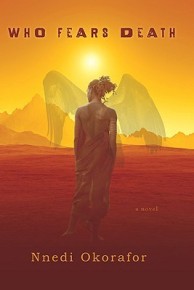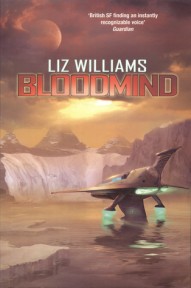
I’ve made the generalization before that mainstream (guy’s) SF is ideas and action driven and that women’s SF is more character driven. Nevertheless, the three books I review here contain a lot of action. In my younger days I read extensively in the SF field before Fantasy started to take over and still do to some extent. Lots of SF circulates around my family, it’s still my son’s main field of reading and long-suffering x-Mrs Legend copped a Cixin Liu for her recent birthday, mostly so as I’d eventually get to read it.
Apart from the great Ursula Le Guin, non-fantasy women’s SF has been hard to come by. Ann McCaffery is ok in small doses, and I have some good books from The Women’s Press Science Fiction series. They “hope that the series will encourage more women both to read and to write science fiction, and give the traditional science fiction readership a new and stimulating perspective.” I think they did, but that was 30 years ago.
As it happens, I’ve read/listened to some excellent women’s SF over the past month, and although my original intention was just escapism, I thought I would knock up a review. Interestingly, some recent Australian women’s writing, even apart from Sue Parritt (here) who writes straight SF, has had an SF feel to it too. In the last year I’ve reviewed Jane Rawson’s A Wrong Turn at the Office of Unmade Lists (here), Georgia Blain’s Special (here), Charlotte Wood’s The Natural Way of Things (here) and Ellen van Neerven’s story Water (here).
Nnedi Okorafor (1974-) is US born of Nigerian parents, did a lot of her growing up in Nigeria, and going by the many prizes she has been awarded, is readily accepted as both an American and an African writer. I listened to Who Fears Death (2010) while I was working and then, when I couldn’t find a paper copy for this review, borrowed The Book of Phoenix (2015) which is billed as a prequel.
It seems, on my limited reading, that Nigerian Lit. contains a great deal of spiritualism (not magic realism!) and particularly in SF, this flows along quite naturally. The story of Who Fears Death is an allegory for the war in the Sudan, between the Muslim/Arabic north and the sub-Saharan African (‘Igbo’) south. It is set in a post-apocalyptic desert where the light-skinned and more technologically advanced Nuru from the north are encroaching on the lands of the darker Okeke. Najeeba, an Okeke woman is raped by a Nuru man who turns out to be the sorcerer Daib, and bears a mixed race daughter, Onyesonwu, who will be the victim of prejudice from both the Nuru and the Okeke. After 6 years living in the desert Najeeba and Onyesonwu settle in an Okeke town where Onyesonwu is educated, initiated (by genital mutilation) with 3 other girls who become her friends, becomes accepted, despite being female, as an apprentice sorcerer with considerable powers, and then takes her friends and her boyfriend on a quest across the desert to defeat Daib. This is a powerful and well written story and I highly recommend it.
Despite having listened to Who Fears Death both before and after reading The Book of Phoenix, I was unable to see any but the most tenuous connection. Nevertheless, it is a powerful work of SF in its own right. Okorafor blogged (here):
These two novels are sisters. Close sisters. But not twins… Similar, but different. How do the stories connect? Who is Phoenix to Onyesownu and Onyesonwu to Phoenix? You’ll have to read them to find out. Don’t bother going in with expectations; you’ll probably be wrong. ;-).
The setting is a near future, in the USA, where the genetic engineering of humans has been commercialized and militarized. Phoenix Okore is a two-year old but mature “accelerated woman” living in Tower 7, LifeGen’s laboratory complex in New York. At first content just to consume data, Phoenix begins to interact with her fellow ‘speciMen’, aquires a lover, then, when he is killed, breaks out, destroying Tower 7 in the process. Becoming ever more powerful, she rampages across the USA and Africa, bringing the Apocalypse:
Not just New York. I scorch the earth, Yes, I can do that. I am that. Phoenix Okore blew across the earth. She burned the cities. Turned the oceans to steam. She was the reaper come to reap what was sown…. Let them die. Let everything die.
It is true that some of the ‘science’ verges on magic, as well as calling on the African god, Ani, but really, the only weak part of the book is the framing narrative, of an African nomad, discovering a trove of ancient, but somehow still working, computers in a cave. He fires one up and listens to Phoenix’s story.
Another blogger (here) writes, “Phoenix’s voice is so powerful in narrating her own tale that not only the anger but the dignity and determination of an entire oppressed people comes through.”

Liz Williams (1965-) is a British SF writer with a PhD in Philosophy of Science from Cambridge. Bloodmind (2007) apparently follows on from Darkland (2006) but is easily read on its own. Despite the fact that SF publishers love a series, I couldn’t find any mention that Williams had gone on to #3 (though she has written other series).
Bloodmind is set in a distant future where humans have colonized many planets and have engaged in genetic engineering to facilitate this. The story switches between the points of view of three women, each on separate planets, until they eventually come together. Vali is a young woman, a soldier whose people are on the losing side of a war on the planet Muspell. Hunan is an older woman, leading a colony of women who have escaped from a city where they had been genetically engineered to be subservient to their husbands. And Sedra, also an older woman, is a hunter at the end of her useful life who is leaving her community to return to the wilds where she will die.
Each woman is well drawn and we care what happens to them. Vali is recruited to go to Sedra’s planet to capture a powerful renegade who turns out to be the daughter of Sedra’s long-lost sister. Although there is inter-planetary travel and some fancy weaponry, most of the science turns on men genetically engineering women for their own benefit (or protection!). As with the Okorafor novels, there are some guys, but they definitely take second place. All three books provide an interesting take on the Independent Woman as super-hero.
Nnedi Okorafor, Who Fears Death, Brilliance Audio (15 hours), 2010. Read by Anne Flosnik
Nnedi Okorafor, The Book of Phoenix, Daw Books, New York, 2015
Liz Williams, Bloodmind, Tor, London, 2007
Re super heroes, Helen Razer is at her scathing best in this article on the appointment of Wonder Woman as UN Honorary Ambassador for the empowerment of women and girls.
*snap* I just read a review of Cixin Liu’s 3rd book in the trilogy over at my friend Becky’s blog, see https://beckylindroos.wordpress.com/2016/10/27/deaths-end-by-cixin-liu/
LikeLike
Thanks Lisa. x-Mrs Legend has an enormous TBR so I’ve probably got time to buy her #2 for Xmas. And 2 SFs for you in one day must have been a trial.
LikeLike
ROTFL: don’t tell anyone but yours tempted me. Just a little bit…
LikeLike
[…] another plain vanilla American novel, with none of the African rhythms of other Nigerian writers, Nnedi Okorafor say, or Ben Okri. The Road was also less than I expected, just ordinary, post-apocalyptic SF. I get […]
LikeLike
[…] fore recently is Speculative Fiction and in particular Women’s SF – which I have argued elsewhere differs in significant ways from Men’s (aka ‘Mainstream’) SF. I wonder (idly!) if […]
LikeLike
I’ve read Okorafor’s writing before (Binti, Akata Witch, Zahrah the Wind Seeker) and at the time, I thought what I was reading was magical realism. You’re right — it isn’t truly magical realism, at least, not all the time. There are moments of deep spiritualism, but I also wonder (particularly in Akata Witch) if there is magical realism? It’s a fine line, to be sure. I wonder who gets to decide all these labels anyway? And, interestingly enough, I personally classify Binti as science fiction but Akata Witch and Zahrah the Wind Seeker as fantasy. These lines also blur so easily.
The Book of Phoenix appeals to me more than Who Fears Death. I’ve been told that Who Fears Death is very violent, and I shy away from graphic writing. I’ve also added Darkland and Bloodmind to my TBR. Thanks for sharing this with me, Bill!
LikeLike
I don’t like leaving links on other people’s blogs, but it seemed a propos so I took the risk. I find Magic Realism problematical, mostly because it became a fad for mainstream Anglophone literature without it seemed to me any understanding of what its originators were trying to achieve. On the other hand it seems to suit the worldview of African and Australian Indigenous authors. I don’t believe in spirits but for people whose worldview includes spirits, Magic Realism seems to be a way of expressing that.
Up till now I have been reliant on public libraries for my audiobooks, but I have an Audible subscription so I just need to make my phone talk to my truck radio (yes, I know it’s standard for most people) and I’ll chase up those Okorafors. Though Melanie has persuaded me that first up will be Joan D Vinge’s Snow Queen.
LikeLike